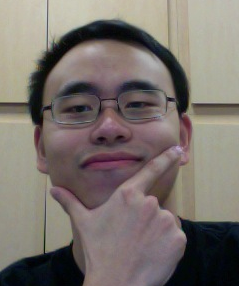- Office: LSRC D237
- Office Hours: Mon 2-3, Tue 1:15-2:15pm, Wed 1-2
(You can also come by anytime for a quick question,
I'm usually in Mon-Fri til 2:45pm,
sometimes later on Mondays and Thursdays.)
- Email:
- Phone: 660-6595
|
|
Graduate TA: Rohit Paravastu
- Office: LSRC D104
- Office Hours: Tuesday and Wednesday from 3-4:30pm
- Email: rohit AT cs.duke.edu
- Phone: 660-6504
|
|
Undergraduate TAs
Jimmy will have consulting hours in the link Wednesdays 8pm-10pm.
Here is his picture.

Course Meeting Time
- LECTURE: Tuesdays and Thursdays: LSRC D106, 11:40am
|
|
Texts
An Introduction to Formal Languages and
Automata, Linz, 5th Edition, 2011.
|
JFLAP: An Interactive Formal Languages and
Automata Package, Rodger and Finley, 2006.
|
| |
Reading
In general you should read the text in order to be prepared to ask and
answer questions in class. If you've looked at material before it's
discussed in class you'll get much more out of the class discussion.
This is especially true once class has been going for a while.
There will be reading quizes on sakai due before each
class! They must be completed before class time, there will not
be second chances.
Web page
Many of the materials for this course (including this page)
are available on
http://www.cs.duke.edu/courses/spring12/cps140/
Bulletin Board
You should regularly read the Piazza bulletin board for this course.
as it may contain announcements, hints, and information relevant
to this class.
Collaboration
Homework assignments should be your own work!
You may consult with one or two other students (and as many times as you
want with TA's and Prof. Rodger) on homework.
Consult means you can discuss the general idea of a homework problem
before writing it up.
Each person should write their own answers.
For each homework
you are expected to include a list of the people with whom you
have consulted (including students, TA's, tutors, professors).
Finally, you may not consult with the same CPS 140 students on two
consecutive assignments.
Tests must be your own work.
Grading
| classwork/participation | 5%
|
| readingquiz | 5%
|
| programming projects | 15%
|
| homeworks | 15%
|
| tests (2) |
30%
|
| final exam |
30%
|
Grading is done on an absolute, but adjustable scale. This means that
there is no curve. Anyone earning 90% or more of the total number of
points available will receive a grade in the A range (A+,A,A-); 80% = B, 70% =
C, 60% = D. This scale may go down, but it will not go up.
The tests and final exam will be closed-book.
The final exam is scheduled for Tuesday, May 1, 2011 from 9am-noon.
